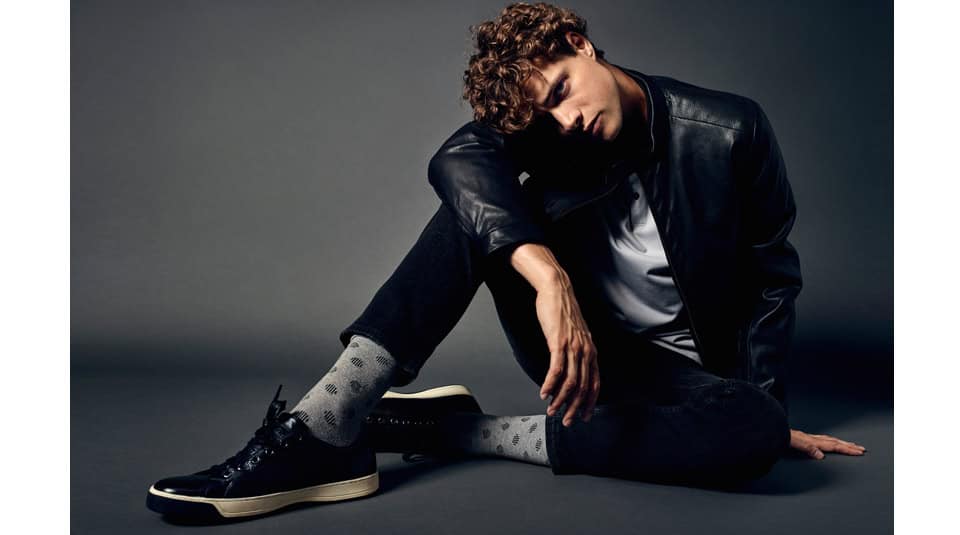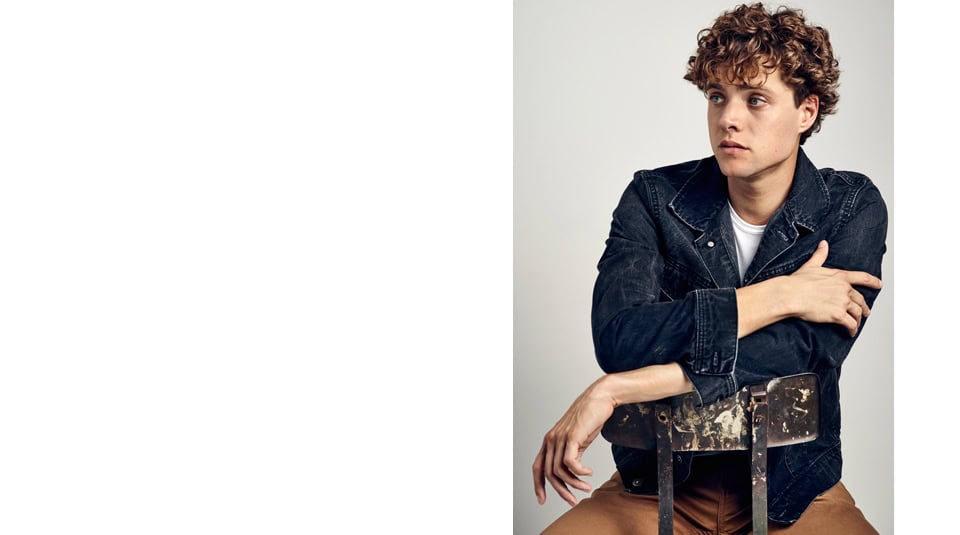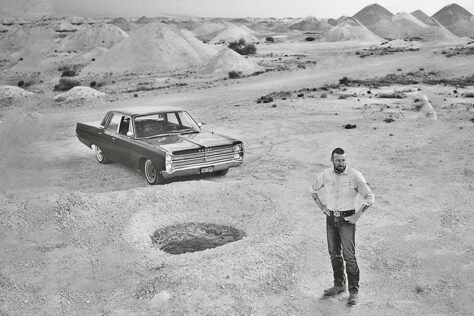I was in the first scene of The X-Files episode. It’s a bit hazy for me. I was young. I don’t remember, man. That was 22 years ago? Oh my god...
“I remember thinking that he spoke really bizarrely and not understanding why.” Today, Douglas Smith is jogging his memory about Blast from the Past. In Hugh Wilson’s 1999 romcom, the 32-year-old played a young Brendan Fraser at age 11, and the halting speaking style is of course in reference to Christopher Walken who also starred in the film. As you can probably glean, Smith was super green back then. “I had no idea who [Walken or Sissy Spacek] were,” Smith continues.
Smith remembers driving home with his mother following the Blast from the Past premiere at Paramount Studios so many years ago, asking her, “Is there anything else I can audition for?” Presumably, this is when the reputed acting bug bit. He came full circle this month when he attended the lavish premiere of TNT’s new period drama The Alienist on that same Paramount lot.
An adaptation of the bestselling 1994 novel of the same title by Caleb Carr, The Alienist centers on a series of murders in 19th century New York City. Tasked to solve this riddle by a young Theodore Roosevelt is alienist—an archaic term for a modern-day forensic psychologist—Dr. Laszlo Kreizler (Daniel Brühl). An elite team is assembled to conduct a secret investigation into the killings, including New York Times illustrator John Moore (Luke Evans), police department secretary Sara Howard (Dakota Fanning), and NYPD detectives Marcus and Lucius Isaacson (Smith and Matthew Shear), fraternal twin brothers charged with running a parallel investigation.
The series premiere of The Alienist airs on TNT on January 22.
I understand that you’re taking a class. What are you studying right now?
Well, I’m taking two different classes: jazz history and screenwriting.
Very cool. Before we get into that, congratulations on The Alienist.
Thank you very much. We’re all really excited.
I believe your casting on the show was announced last February so it’s been a full year now.
You’re absolutely right because I remember getting the call a few days before Valentine’s Day, when I went to see Casablanca with my fiancée. As pretty much any actor can relate, I got the audition, the logline, the premise, and in this case, also the script. I was given the first and second episodes to read. I prepared three scenes on tape and sent it to the casting director. I know that the actor who plays my twin, Matt Shear, had been flown out to London to read with three actors that were auditioning for my role. I think that happened around the time I sent my tape in. They were not happy with the actors reading opposite Matt, but they really liked him. So they sort of went back to the drawing board to see who they could envision playing my character Marcus. A lot of this business is luck and good timing and I think that played into it a lot. When the job was offered to me and I joined up, I went deeper into the research. I didn’t read the novel before the audition because you can only commit so much to these things until they hire you. That’s just practicality.
The big premiere took place at Paramount Studios earlier this month. Was that your first time seeing the show in its finished form?
Yeah! It’s funny because I’ve given interviews, but before I had seen it. [Laughs] That was my first time seeing the whole thing put together, although I saw a fair amount of footage in ADR. It was a really exciting night. It was much larger and more glamorous than anything I imagined or expected. In this era of Hollywood we’re in now, it’s not very common to have opulent premieres that are thrown by movie studios or television networks. And we’re a television show, as I keep reminding myself. It’s hard to remember that when you’re watching it in a movie theater at Paramount and when it looks as cinematic as it does. It really does feel like a ten-hour long movie.
Paramount is one of the more classic, old Hollywood lots. I’m a bit of a history buff and I remember reading about the guy who ran Paramount, Adolph Zukor. Walking onto the lot, there’s the red carpet, you take photos, and there’s a piano player playing ragtime music, which is historically correct for the time period of our show. There are speeches, we watch the show, and then we all walk the New York backlot. They had the art department dress it up to look exactly like the world of The Alienist. The interiors of the storefronts were accurate to the show. They turned a lot of the stores into Delmonico’s and served you a four-course meal. You walk into another storefront and they’re serving cocktails like a speakeasy. There were trapeze artists performing in the street. There was a snow machine. They had actors dressed up as cops, grabbing people and pretending to throw “premiere-goers” in jail, so it was interactive. It was wild. It was an event.
The show is obviously created by Cary Fukunaga of True Detective fame. Caleb Carr, the novelist and co-creator says it took “20 years of struggle and failed attempts” to adapt this for the screen. What excited you most going into this world?
I was really excited about the possibilities for my character Marcus. He seemed a little wild, a little untamed. It’s a pretty buttoned-up society that’s depicted on the show: the Gilded Age of New York City. They show you a pretty up-close look at the wealthy like J.P. Morgan and Theodore Roosevelt. Dr. Kreizler, the character that Luke Evans plays, and Dakota Fanning’s character are very wealthy as well. But then you’re going home with the Isaacson brothers, Marcus and Lucius, and we’re in this little pediment with candles and a senile mother. We’re out on the bustling streets with the fish mongers, people yelling, and children trying to steal stuff from your pockets. They’re both detectives, trained, and intelligent, but unlike his brother who responds to his environment by being really paranoid, Marcus responds in the complete opposite way. Marcus wanders into a socialist meeting and finds a girl to take home to bed because he likes the way she looks. He meets a priest and—wait, I shouldn’t talk too much in detail because that’s a later episode. Basically, he’s a bit wild. He’s very buttoned-down in a buttoned-up society. They’re sort of thrown into this upper-class world when they’re assigned to help Dr. Kreizler on the case by Teddy Roosevelt.
We definitely don’t want to spoil anything here. Are you normally good about keeping secrets on a show like this? I’m such a loudmouth. I know I would have a hard time with it.
It is a little hard. It’s tricky. That’s why I was just like, “Maybe I shouldn’t talk about that…” [Laughs] I do know that the first two episodes were already given to the press. I want to talk about it excitingly so it’s a fine line to walk. I just want to talk about the whole thing. It’s also hard for me to remember what happens when because I approached the filming of it all as one long movie. We didn’t film an episode, say goodbye to that episode, and then go to the next episode.
What was it like being on location in Budapest?
I couldn’t have found Budapest on a map before I got this part. I mean, I knew it was like northwest of Greece and northeast of Italy, but there are a lot of countries in that little area. It was an experience of a lifetime. I sort of wanted to have that experience of going to a European country and being a resident and working like a local, as opposed to being a tourist. I’d been to Europe and traveled around before, but I never got to have an experience like this. It was something I thought might happen down the line, but I just kept getting older and never got that experience. Then I got the call to work on this. I also thought it was going to be in New York at first, not Budapest. It’s pretty far from L.A. and that had its challenges because I believe it’s a nine-hour time difference. Like I said earlier, I have a fiancée in L.A. It was a bit challenging to stay awake because she would get off work at the end of the day and for me that would be like 3 A.M. in Budapest. It definitely required some effort to stay in communication.
You’ve done a wide range of things on TV over the years, including HBO’s Big Love and more recently Vinyl. Was your bit part on The X-Files the first professional gig?
I think so. You know—I wonder about that, too. It’s a bit hazy for me. I was young. I know that my first movie role was Blast from the Past because I remember that a little more clearly. I was in the first scene of The X-Files episode. I don’t think I had an agent. I didn’t identify as an actor is the best way to say it. I was a punky sort of loudmouth kid. They were shooting it in my hometown. I don’t have any memory of the audition or anything. I just remember having to go out to some field one day. I don’t remember, man. That was 22 years ago? Oh my god… I think that might’ve been my first time ever doing that in front of cameras and speaking lines.
We were living in Los Angeles for six months because my brother was filming and playing the lead in a movie called Small Soldiers. Me and my other brother and my sister were pulled out of school in Canada to go to school in L.A. I was visiting my brother’s set and I remember the casting director for Small Soldiers thinking that I looked liked Brendan Fraser. I went and auditioned for the movie and they called my mom as we were driving home, saying that I got the part to play young Brendan Fraser. I was excited because I was a fan of George of the Jungle. You know—Hugh Wilson, the director of Blast from the Past, actually passed away a couple of days ago. I remember having a really good time on that set. I think I shot that for about a week with Christopher Walken and Sissy Spacek. I had no idea who they were. I remember thinking that Christopher Walken spoke really bizarrely and not understanding why. [Laughs]
Do you think that’s when you caught the acting bug?
The first time I really felt like, “I like acting,” was definitely on Blast from the Past. I always think of that as the first moment of seeing acting as something I wanted to do more of. I actually saw that movie at Paramount. I remember saying to my mother on the way home, “Is there anything else I can audition for? Now?” [Laughs] I think it was two years later in high school that I told my mother I actually wanted to pursue it and get an agent. We were living in L.A. at that point, not because of me but just because half of my family were from here and they had moved back.
What about watching your brother Gregory on set going through the motions as an actor on a film like Small Soldiers? Did you have curiosity from that?
If anything, I didn’t want to be an actor because my brother was doing it so it was the opposite. We were really close in size and age, and we played sports together, so I actually liked being different from him. I was a better wrestler, a better runner. He was a better skier. Things like that. We were competitive in sports. I remember thinking that acting was Greg’s thing, but it goes deeper than just my brother because our grandfather was also an actor. Our mother tried acting right after college, but she just stopped pursuing it. Our father is a film producer. The first time I was truly curious about acting was from Blast from the Past. I didn’t think anything after doing The X-Files. I probably didn’t even watch the thing until ten years later so that to me was a non-experience. It’s something I value much later in life because it turned out to be one of the scariest episodes The X-Files ever made. It’s pretty awesome to have the luck of being in the right place at the right time.
I found a clip of your band, His Orchestra, performing live on MTV Canada. Are you guys still active? Where does music fit into the bigger picture with you?
Well, it’s something that I don’t do as much of anymore. But I’d like to. I have no one to blame but myself. I just wasn’t able to emotionally handle both film and music at the same time in my mid-20s so I chose to let the band sort of fall apart. I was fully committed to my work on Big Love at the time. It was getting more and more stressful as the band naturally wanted to grow with more tour dates and things like that. I couldn’t commit. It just became too difficult. I do still play music sometimes, but I used to rehearse four days a week and play shows on most weekends. Now I’m lucky if I meet up with my old band mates once every six months and play music. I pick up the guitar a lot of days. I brought it with me to Budapest. All the crew members knew me as the actor who was always wailing on his guitar. So it’s still a part of my life, but not in that professional way.
So at one moment in time it was something you were pursuing in a career capacity.
Yeah, yeah, yeah. I just gave up on it, I guess.
You were telling me that you’re taking a screenwriting class. Is that another career goal?
I used to write a lot more when I first moved out to L.A. When I was going to acting class every week—I don’t go to a weekly acting class right now, but I did go for many years—I was writing scenes as a sort of exercise that our acting coach gave us to fool around with what we could also perform. I remember taking these two characters and turning that into a feature film. I adapted a novel once. I wrote another feature film. So I wrote a lot. Maybe ten years ago I was much better at finishing things. As I got busier with the band, the writing sort of fell off. Then as I stopped playing in the band, I returned to writing more. I felt like I could benefit from a school environment with the writing just because I start a lot of things and get lost along the way. I’m pretty heavily ADHD so it’s hard for me to stay with a thought. I’m also a pretty harsh critic. It’s a weird thing. It somehow feels easier when you’re less critical and just keep writing until you get to the end. I think I did that when I was younger, but now I seem to critique it midway and get demoralized and walk away. I’ve read plenty of screenwriting books and I’m friends with a lot of screenwriters who do it for a living, but I’m trying to see if a school environment will maybe help me.
Let me ask you a different kind of question: what quirks do you have?
What quirks do I have… I know I have quirks. [Douglas turns to his fiancée and laughs] She said that I’m very flexible. I’m a yogi. That’s a quirk. I’m a bit like spaghetti. Speaking of spaghetti, she always has to ask me three times whether I’m hungry or not. Usually, she asks me and I say no. The second time, it’s the same answer. The third time, magically, it’s, “I’m hungry right now.”



 Clarion Call: Garrett Hedlund
Clarion Call: Garrett Hedlund A Conversation with Simon Baker
A Conversation with Simon Baker
No Comments